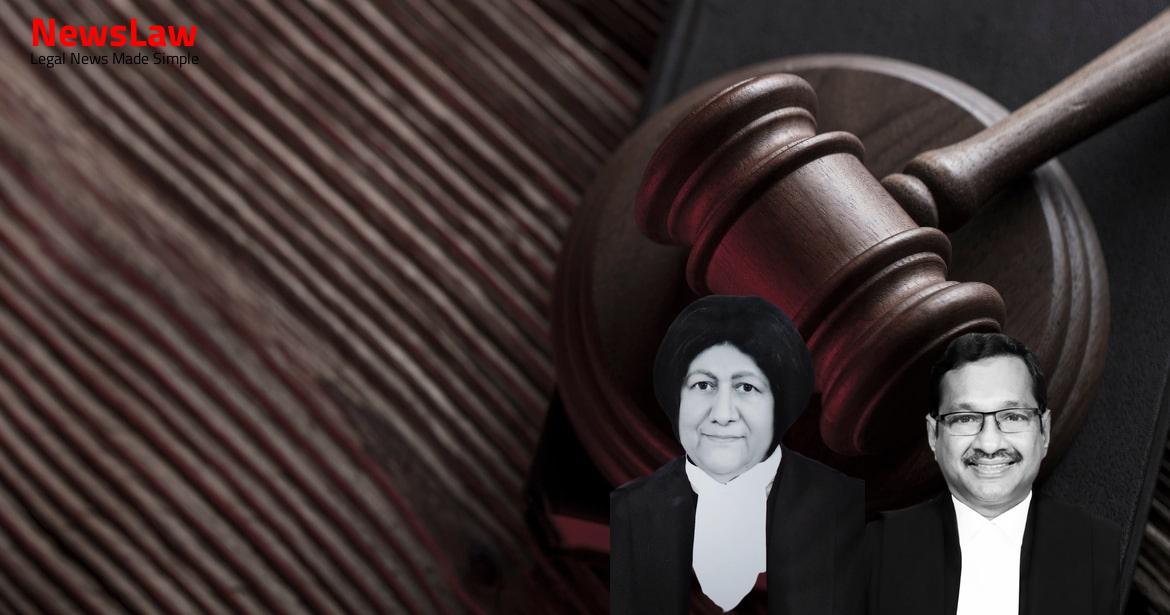Explore the in-depth examination of the court’s powers in granting a stay of an arbitral award. The legal analysis presented sheds light on the nuances of the law and the considerations involved in such decisions. Stay tuned to understand the complexities of this legal process.
Facts
- The Respondent filed an application on 20 August 2018 to deposit the awarded amount with interest in the High Court.
- Various interim applications were filed by both parties at different intervals.
- The Appellant filed an application on 3 December 2017 seeking a stay of the arbitral award under Section 36(2) of the Arbitration Act.
- The Respondent filed an application on 11 December 2017 seeking security against the awarded amount by the Arbitral Tribunal.
- The High Court issued notice on 14 December 2017 and directed the Appellant to file an affidavit of assets.
- The court opined on 17 February 2020 that the Respondent’s application for interim relief should not have been decided before considering the Appellant’s application for a stay.
- The Appellant complied with the orders by filing supplementary affidavit of assets and details of assets.
- On 17 February 2020, the Single Bench passed an order directing notice to be issued on respondents regarding the application of the Appellant under Section 36(2) of the Arbitration Act for stay of the award.
- On the same day, a Single Judge of the High Court disposed of the application filed by the Respondent under Section 9 of the Arbitration Act (O.M.P (I) (COMM) No.523 of 2017) along with connected interim applications.
- The Court directed that upon deposit of Rs.142 Crores, as previously instructed in the Respondent’s application under Section 9 of the Arbitration Act, the enforcement of the award dated 17 October 2017 would remain stayed if done within four weeks.
Also Read: Ex post facto Environmental Clearance in Bio-Medical Waste Case
Arguments
- Appellant’s application for stay under Section 36(2) filed before Respondent’s application for interim relief under Section 9.
- High Court’s clubbing of orders deprived Appellant of appeal against Section 9 order.
- Order under Section 36 is not appealable, unlike Section 9.
- Clubbing of Section 36(2) and Section 9 applications impacted Appellant’s appeal rights.
- Argument made on the court’s power to grant stay of operation of the Award under Section 36(3).
- Mr. Viswanathan argued that although the grant for stay is discretionary, its exercise is mandatory.
Also Read: Land Dispute Legal Analysis
Analysis
- The power of the Court to grant unconditional stay of an award is not unfettered and may be enforced in accordance with the provisions of the CPC.
- The exercise of discretion requires ex facie consideration of the merits of the challenge, which was not done in this case.
- An award can only be stayed for reasons to be recorded in writing, and for grant of stay in the case of an arbitral award for payment of money, the Court must consider provisions for grant of stay in a money decree under the CPC.
- An application for interim measures can be made before, during, or after the arbitral proceedings but must have sufficient grounds.
- The Court cannot stay an award without valid reasons, and there is no rule that earlier applications must be heard before later ones.
- Sitting in appeal over the impugned award and examining the adequacy of evidence before the Arbitral Tribunal is not the role of the Court at this stage.
- The contention of the award being against public policy lacks specific particulars, and applications under Section 9 and Section 36(2) relate to the same award.
- The power to grant stay of an award under Section 36(3) comes with the duty to impose conditions, which could include securing the award by deposit in Court.
- Both applications by the Respondent under Section 9 and the Appellant under Section 36(2) have common factors to be considered, and the jurisdiction of the Court under Section 9 is wide.
- The power of unconditional stay is subject to the condition that a prima facie case of fraud or corruption in the arbitration agreement or the making of the award is made out.
- Section 36 of the Arbitration Act deals with setting aside an award.
- Section 9 of the Act provides for the amendment of certain provisions.
- Filing an application under Section 34 does not automatically render the award unenforceable unless a stay order is expressly granted.
- Conditions may be imposed by the Court when granting a stay of operation of the award.
- Security covering the entire amount of the award including interest may be required for granting a stay.
- The Court must consider the provisions under the CPC for granting a stay of a money decree when dealing with an application for stay of an arbitral award for payment of money.
- If a prima facie case of fraud or corruption in the arbitration agreement or making of the award is established, the Court shall grant an unconditional stay of the award pending disposal of the challenge under Section 34.
- The Delhi High Court and the Bombay High Court have provided correct interpretations of the relevant laws in specific cases.
- Section 9 of the Arbitration Act grants the Court broad authority to issue orders to secure the amount in dispute in arbitration.
- This power can be exercised before the commencement of the arbitral proceedings, during the proceedings, or even after the arbitral award has been made but before its enforcement under Section 36 of the Arbitration Act.
- The Court’s consideration in granting interim measures includes assessing if the applicant has a good prima facie case
- The Court also considers the balance of convenience in favor of granting the interim relief
- The timeliness of the applicant’s approach to the Court is a factor taken into account
- There is an award of Rs. 142 Crores in favor of the Respondent
- No strong grounds have been presented prima facie to interfere with the award
- Order 41 Rule 5 of the CPC allows for a stay of decree with cash security
- The High Court was justified in its actions under Section 9 of passing the judgment and order
Also Read: Legal Analysis of Appeal Provisions in Admiralty and Commercial Court Cases
Decision
- The Appeals are dismissed.
- The High Court is requested to dispose of the pending applications of the Appellant under Section 34 for setting aside the award within 3 months from the date of communication of this judgment and order.
- No ground found to interfere with the decision.
Case Title: SEPCO ELECTRIC POWER CONSTRUCTION CORPORATION Vs. POWER MECH PROJECTS LTD. (2022 INSC 981)
Case Number: C.A. No.-006789-006789 / 2022



